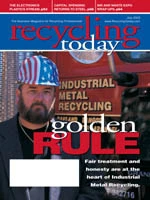Sustainability is a buzzword that may or may not last into the coming decades. Environmentalists are convinced that sustainability—defined in part as the ability of products to be part of a closed loop that allows resources to be renewed and conserved—is an inevitable economic trend.
Other observers are more skeptical, noting that dire predictions of dwindling resources have been made before, only to be proven inaccurate.
In the past couple of centuries, the market has addressed resource shortages through pricing mechanisms and research efforts to find replacements. There is no reason to doubt that profit-driven individuals and corporations will continue to find such solutions. At the same time, producers of materials that could someday be in a shortage situation have been wise to develop the closed loop that can lead to sustainability.
In a recent address printed on pages 12-16 of this supplement, Alcan Inc. executive vice president Brian Sturgell makes the case that aluminum producers should trumpet the sustainability advantages of their material.
His contention is that aluminum as a material is ahead of the curve on the sustainability front, with an argument resting in part on its recycling value compared to other packaging materials and other materials collected by municipal programs.
The aluminum industry has carved out a critical role for scrap, and the metal has chemical properties that lend to continuous recycling and re-melting.
This is nothing new to scrap recyclers, who have long been aware of the awaiting markets for nonferrous industrial scrap and obsolete items made from aluminum, copper, brass, stainless steel and other nonferrous metals.
We hope those same recyclers will enjoy this year’s Nonferrous Scrap Supplement, and will find a few ideas worth retaining.

Explore the July 2003 Issue
Check out more from this issue and find your next story to read.
Latest from Recycling Today
- Green Cubes unveils forklift battery line
- Rebar association points to trade turmoil
- LumiCup offers single-use plastic alternative
- European project yields recycled-content ABS
- ICM to host colocated events in Shanghai
- Astera runs into NIMBY concerns in Colorado
- ReMA opposes European efforts seeking export restrictions for recyclables
- Fresh Perspective: Raj Bagaria






